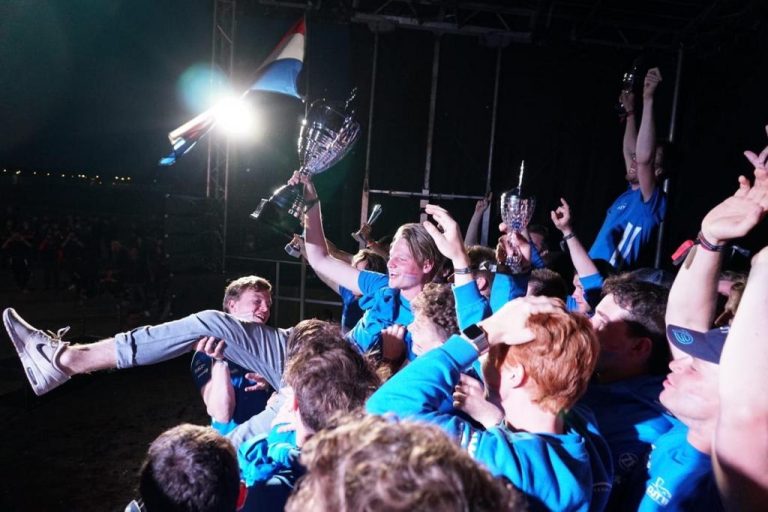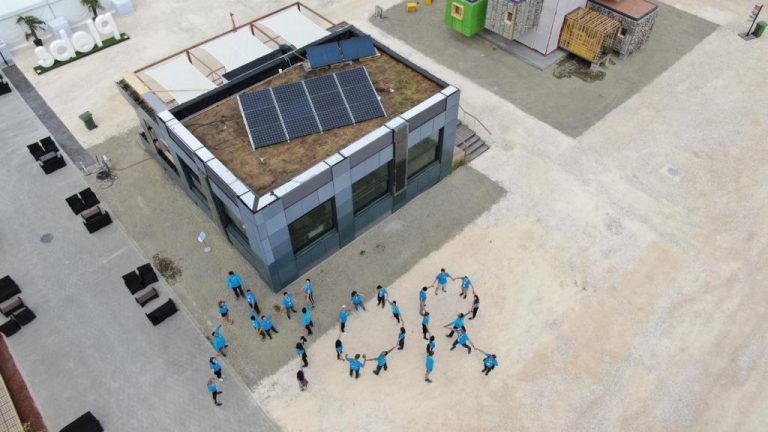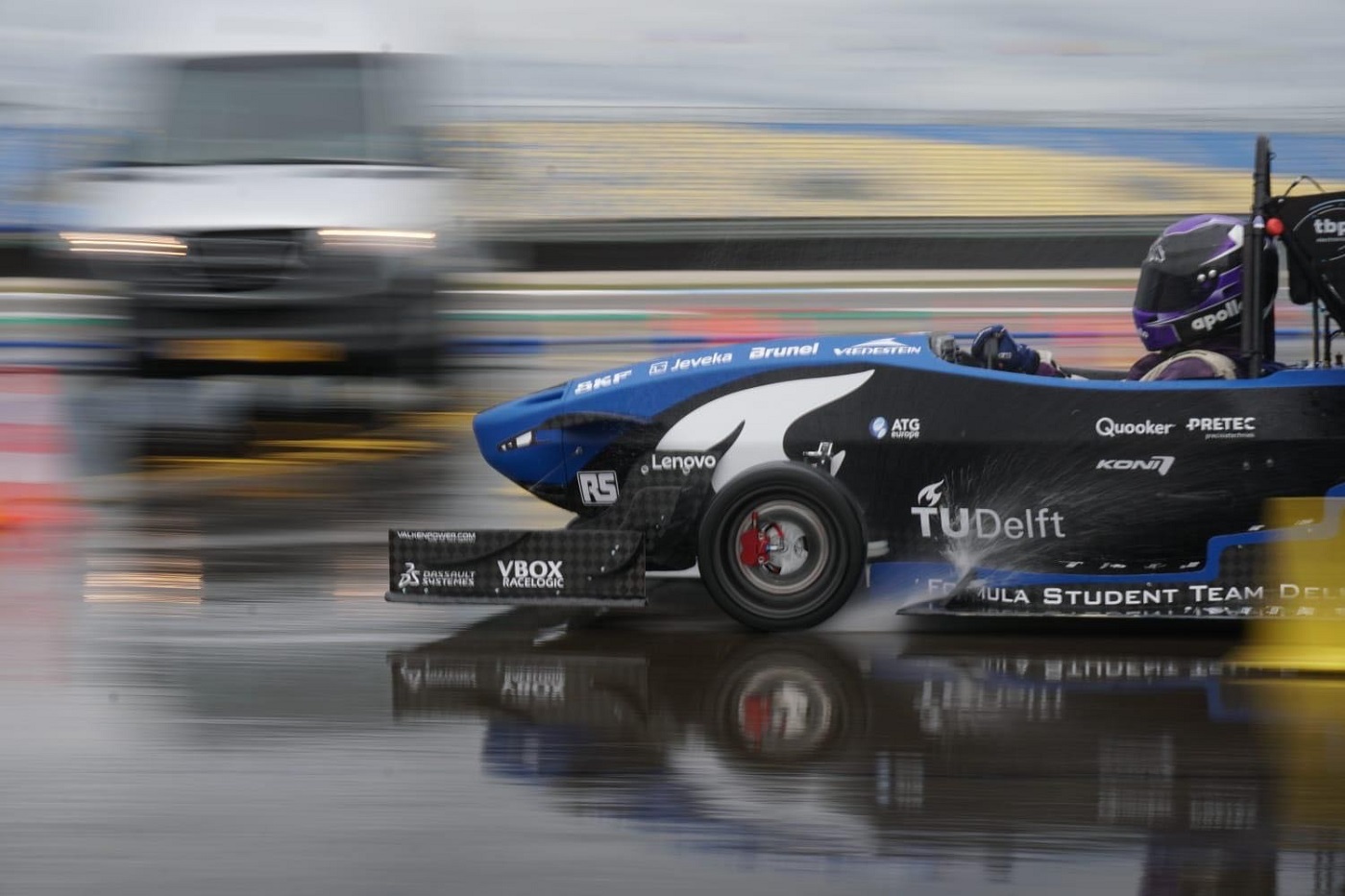Empty lecture halls and deserted university libraries. Students and staff were away for a few weeks, but life in the land of higher education did not stand still.
The winning race at the TT Assen. (Photo: Formula Student)
Formula Student wins in Assen
A newsflash from one of the fastest dream teams of TU Delft, the Formula Student (FS) team. In mid-July, they won the Formula Student Netherlands competition. On the TT circuit in Assen, the racing car DUT 19 proved its superiority after several parts of the competition. The five-day event attracted a wide range of participants, with no fewer than 21 university student teams.
 (Photo: Formula Student)
(Photo: Formula Student)
Delft Hyperloop came in fourth
After 122 safety tests in one week, the tension on July 21 for the TU Delft student team could be cut with a knife. They had been invited by Elon Musk to the 2019 SpaceX Hyperloop Pod Competition in Los Angeles. Once there, they were chosen along with three other teams to race their hyperloop pod in the vacuum tube of SpaceX. The pod is a vehicle that can achieve extremely fast speeds in such a tube due to the almost complete lack of air resistance. Unfortunately, they could not go faster than 196 km/h due to a communication problem on board. They ended in fourth place. A team from the University of Munich won with a speed of 465 km/h.
TU Delft Hyperloop final run (Video: TU Delft)
Human Power Team unveils VeloX 9
On July 27, students of TU Delft and VU Amsterdam unveiled their super-fast, aerodynamic recumbent bicycle, VeloX 9, at the National Military Museum in Soesterberg. They intend to use it in September to break the speed racing world record of 121.8 km/h in the women’s category. What is their secret? Several improvements include tyres specially developed for the team and the lack of a window, for better aerodynamics.

(Photo: Bas de Meijer)
Just missed first at the Solar Decathlon Europe 2019
From the start of the ‘Building energy-efficient houses’ competition, the TU Delft team – and the only Dutch team – was positioned at number 1. The students of the MOR, Modular Office Renovation, team were only beaten during the finale on July 28 in Szentendre, Hungary, by the French team HABITER2030. The championship consisted of ten parts, for which the TU Delft team won three first places, four second places and one third place
 The MOR team at its location in Szentendre. (Photo: MOR)
The MOR team at its location in Szentendre. (Photo: MOR)
Subsidy to detect parasites
Jan Carel Diehl (IO, design for sustainability) heard on July 30 that the work on the overlooked tropical infectious disease Schistosomiasis was going to be supported by a subsidy worth €1.5 million. Diehl is collaborating on this with LUMC and the universities of Lagos and Ibadan. IO is developing the diagnostic tools that local healthcare workers can use to detect the parasites in urine samples.
49 shades of infrared at TNW
Akira Endo (TNW) received good news last summer. His article (with 38 co-authors) on the Dutch-Japanese infrared spectrometer DESHIMA was published on August 5 in Nature Astronomy. The chip, the size of a two euro coin, was successfully tested in the ASTE telescope in Chili. Endo developed the chip, which can distinguish 49 shades of infrared, to determine the distances to and age of the farthest (and thus oldest) galaxies.
 The ASTE Aste-telescope (Photo: NAOJ)
The ASTE Aste-telescope (Photo: NAOJ)
New dean for TPM
The Executive Board announced on August 13 that the faculty of Technology, Policy and Management will have a new dean from October 1: physicist Aukje Hassoldt. She has worked in various positions at Rijkswaterstaat (Department of Waterways and Public Works), was involved in forming Deltares, was manager at TNO between 2008 and 2014, and later director of Research Earth & Environmental Sciences. She is replacing the interim-dean Eric Fischer.
New director of Education and Student Affairs
Another person starting on October 1, but then as director of Education and Student Affairs, is Sacha Kroonenberg. She held the same position at the University of Applied Sciences Leiden for three years. Before that, she was director of Operations Projects at Ziggo. She is a member of the national task force on educational logistics of SURF, the organisation for ICT innovation in educational and research institutions. Kroonenberg studied European Studies at the University of Amsterdam.
UvA grants an extra week of vacation
Students of the University of Amsterdam may receive an extra week of vacation in May starting in the academic year 2020/2021. The plan is ‘in the pipeline’, Folia was informed by a spokesperson. It is intended to be a week without studies, to reduce the workload on students. The study burden of the subjects will not change in principle.
Erasmus University tuition fee
Alumni and students of the Rotterdam School of Management had a nice start to their vacation: they learned in July that a portion of their tuition fee will be refunded. For the MBA (part-time) and ‘finance & investment advanced’ programme, they paid €17,000 and €10,000 respectively per year. That is against the rules, judged the Education Inspectorate.
 (Photo: Pixabay)
(Photo: Pixabay)
The university will be compensating them in part: finance students may request a refund of a quarter of their tuition fee, and MBA students may ask for half back. The SP wants to know whether the Minister stands behind this ruling, as the reimbursement was “considerably less than all non-statutory costs charged”. The political party is also wondering if Van Engelshoven is prepared to talk to the university, to find a solutions for all former students from before the 2016-2017 cohort who are not covered by this ruling.
NWO awards 16 Rubicon grants
Sixteen scientists who recently received their doctorates are going abroad with a Rubicon grant to conduct research for a maximum of two years. For many young researchers, a trip like that is an important step on their career ladder. The University of Groningen collected the most awards (2.5). Of the 61 submissions, 26.2% received subsidies from the research council, the Netherlands Organisation for Scientific Research (NOW). Two TU Delft researchers were successful: Dr. Davood Farhadi Machekposhti (3mE) goes to Harvard to develop flexible mechanical metamaterials. He wants to supply soft microrobots with energy, as an alternative to batteries. W.W. Wolszczak (TNW) is working on better radioactive radiation detectors. At the Wake Forest University he wants to build a detector that can distinguish different radiation energies, like colours in light. Other grant recipients are researching the relationship between a difficult youth and health problems and how the belief in equality laid the basis for our modern democracy.
DUO ‘steals’ data
The big news this summer was the story in De Volkskrant newspaper that DUO had violated privacy rules by sending students e-mails fitted with tracking software. This allowed the study grant financer to see whether a message had been received and read. The computer’s IP-address was also registered. But that is not permitted, according to an enquiry submitted to the Data Protection Authority. DUO entered into talks with the supervisory authority and is refraining for now from using the software in personal mails sent to students.
 (Illustration: Pixabay.com)
(Illustration: Pixabay.com)
University of Utrecht leaked data
At the University of Utrecht as well, it seems that the students’ and staff’s private data are not always secure. The institution reported two data leaks in one week. Staff and former staff members had access to the names, e-mail addresses and telephone numbers of around four thousand doctoral students from an outdated system. The other leak allowed desk clerks in the university library to view details of the visitors, including their passwords. Around 13,000 people who had ever created an account there were affected. The University of Utrecht reported both instances to the Data Protection Authority and has launched an investigation.
Fewer international students because of Brexit
Wageningen University is expecting fewer British students because of Brexit. If the UK leaves the European Union before the start of the academic year without agreeing on a ‘deal’, the tuition fee for these students will rise sharply from €2,000 to €18,000 as they will fall under the higher fees for students from outside the European Economic Area (EEA). Dozens of Brits are wondering whether they want to study in Wageningen at that price, reported Resource.
 (Illustration: Elionas2, Pixabay.com)
(Illustration: Elionas2, Pixabay.com)
Students are looking for accommodation
TU Eindhoven is calling on the assistance of seniors and staff to find accommodation for international students. Via the website aplacefornow.nl, they can offer rooms for newcomers for a fee, reported Cursor. The site was created to support the estimated 350 students who are starting this academic year but have not yet found accommodation. They can stay for up to 3 months in someone’s house; longer is not permitted. Judging by the media reports, the shortage of rooms at other institutions appears to be a bit less than last year.
‘Cleaning the garden’
A 22-year-old man from Groningen has been sentenced to community service as punishment for stealing the deposit on 80 crates of beer, reported the Dagblad van het Noorden newspaper at the start of the summer. The garden of the student residence where he was living was full of beer crates, which he cleaned up, in his own words, because his mother was coming to visit. The ‘benefactor’ pocketed the deposit of €312. But his fellow residents did not agree with that action. It was meant to be a form of ‘savings’ for everyone. The judge ruled that the man from Groningen had to pay back the stolen money as well as go to jail for one month for a previously imposed sentence.
Harvest soot
Armed with a facemask, gloves and a map of Amsterdam, 450 first-year students of the Amsterdam Fashion Institute are attacking the soot in the city from September 4. During the ‘Harvesting soot’ expedition, they will scrape soot off the jet-black walls of e.g. the IJ tunnel and the Piet Hein tunnel, reported the Trouw newspaper. The underlying idea is: if the students start thinking about the air they are breathing, they will later as designers contribute to a sustainable fashion industry, according to Jan Piscaer, lecturer in sustainability at the Fashion Institute. The collected soot particles will ultimately be processed into the glaze for an Amsterdam ‘particulates tableware’.
HOP, Melanie Zierse / Delta, Connie van Uffelen, Marjolein van der Veldt, Jos Wassink
Do you have a question or comment about this article?
redactie@hogeronderwijspersbureau.nl


Comments are closed.